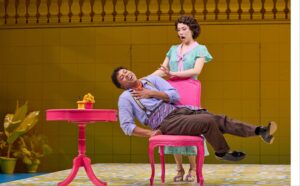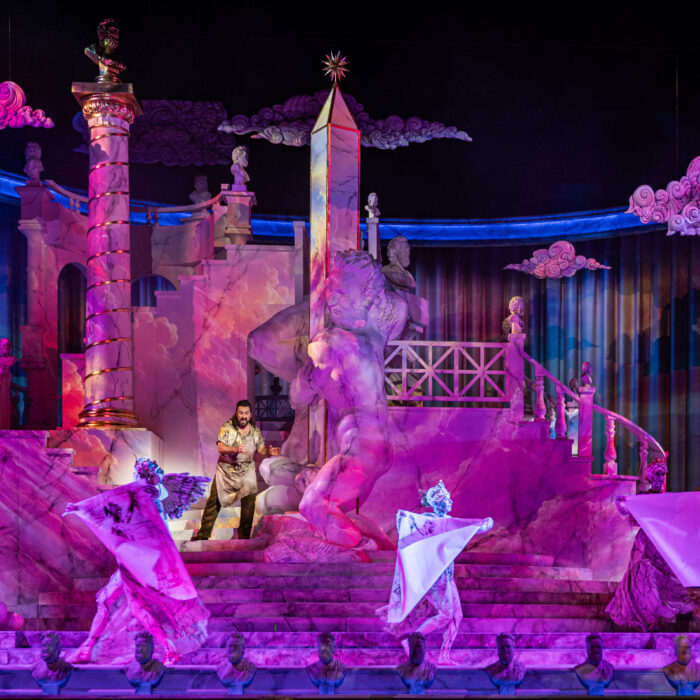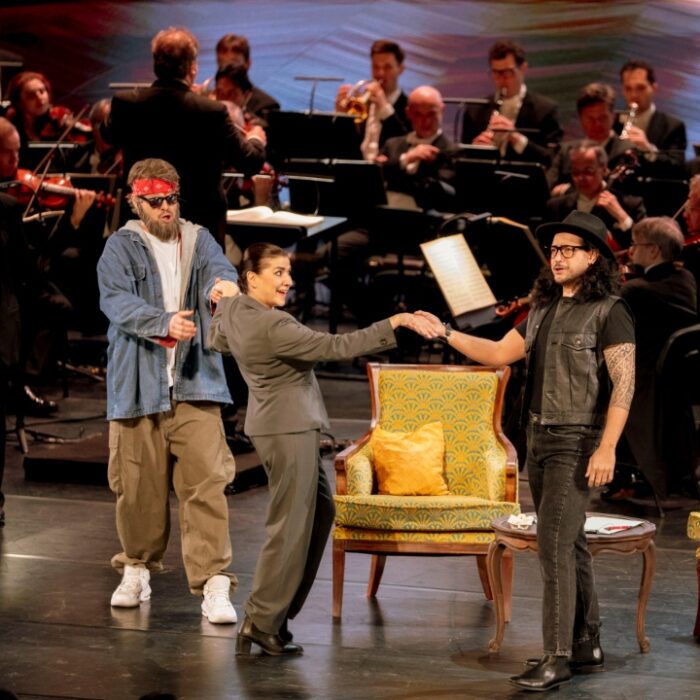
Opera Theatre Saint Louis 2024 Review: The Barber of Seville
OTSL Successfully Stages Two Warhorses, With Puccini’s Winning
By Benjamin Torbert(Photo credit: Eric Woolsey)
“The Barber of Seville” can be tough to sit through. Opera Theatre Saint Louis (OTSL) swam upstream furiously against the libretto’s banalities to produce an entertaining show, with standout performances from Justin Austin in the title role, and Hongni Wu as Rosina. In youth, I received as a gift the London/Decca recording featuring Leo Nucci as Figaro and a very young Cecilia Bartoli as Rosina. In times before comprehensive digital recall of music, television and film, every physical copy of an opera remained precious. Bartoli arrived as a revelation. Yet, I found myself consistently losing interest after the tenth track, “La Calunnia.” “Barber” clocks surprisingly long, roughly two and three quarters hours uncut—OTSL excised around twenty-five minutes, which Tent-goers complained about, while your reviewer sighed in relief. And the opera covers the same comedic territory over and over. And over again. After about an hour, its pull-my-finger slapstick becomes wearying. “Barber” makes “Don Pasquale” look like “The Elixir of Love,” and it makes “Elixir” look like Shakespeare’s “Hamlet.”
One man’s opinion. But “Barber” is probably the single most-programmed operatic comedy, and audiences purchase seats. Nonetheless, you’ve got to do something with this piece, or the second half of Act one drags until the customary Rossinian confusion ensemble (“Mi par d’essere con la testa”)…and then Act two offers more of the same. Unlike “Bohème,” “Barber” almost demands that the participants tread some new ground with the staging. Director and choreographer Eric Sean Fogel, in a main season debut at OTSL, identified some solutions, First, queer the work, slightly—twelve percent? A difficult lift because like most 19C opera, “Barber” is aggressively heteronormative. Second, pop colorize it; Andrew Boyce’s sets rattled the retinas in traffic light yellows and hot pink. In a director’s note, Fogel admitted “the opera is notoriously difficult to stage.” Though he claimed a setting of 1930s Spain just prior to its Civil War, south Florida seemed just as likely for the color palette. The directorial framework successfully moved the work into a surreal, cartoonish register.
Mouths provided the chief visual motif, projected here and there, on drops, and in the form of a sofa kissing the sitters’ butts. There were a lot of butts, in fact; one trap window showed us a jumbo femme derriere. Figaro’s barber’s chair took the form of an ass-grabby hand. Not one piano, but a train of four Pepto Bismol pink uprights formed the funniest part of the staging, sliding in like a typewriter carriage for Act two’s music lesson. And Austin’s Figaro slathered Nathan Stark’s Dr Bartolo in a reckless, aptly Bugs Bunnyesque exchange of Barbasol.
How do! Welcome to my shop. Let me cut your mop.
Fogel stated an aim of centering the title character rather than the amorous dyad, and on this count the production earned an A+. Returning from last year’s delightful “Treemonisha,” as Figaro, baritenor Justin Austin warmed the audience in a secure, sand-colored timbre. He transpired rizz omni-directionally, all evening. Appearing in pinstriped brown trousers, rolled oxford blue sleeves, suspenders, and a neck kerchief, he slid in with a fluid gestural language and athletic proprioception. As needed, he demonstrated superb, clear diction in “I’m the most popular guy in Seville, hello” (“Largo al factotum”). Kelley Rourke’s 2015 translation for OTSL, repeated here, attempted the impossible, rendering the uncapped fire hydrant of text in Cesare Sterbini’s libretto, with a pleasing couplet to close Figaro’s famed aria: “Some call me lucky, but I call it skill / I’m the most wanted man in Seville.” The translation melded well with the notation but repeatedly exposed the inherent flimsiness of “Barber.” The chorus supported Austin with some vaguely campy backup dancing, and to huge applause he reclined and counted money at the aria’s close.
Indeed, Figaro the hustler accumulated cash in all sorts of social transactions. Later in Act one the soldiers danced with sunflowers inserted into their gun barrels, as in the well-known photograph of the performance artist Hibiscus, of the Cockettes, protesting the Vietnam War, and recalling the silly soldiers in Woody Allen’s “Bananas.” Fogel’s choreography impressed; how did no participants trip over each other? While many of these directorial choices worked, they could not escape the elapsing opera’s sameness, as the ensemble’s theatrics underscored how Figaro-dependent are most of the funniest moments in “Barber.” When Austin finally got a chance to shave Stark’s Bartolo in Act two, audience guffawed.
I’m Your Little Seño-ri-ter
Mezzo-soprano Hongni Wu gave a performance just as impressive as Austin’s unflappable tonsorialist. She boasts a distinctive, unusual voice, the head voice pleasant and more conventional sounding, but her chest voice astoundingly rich and robust. Mezzos who sing Rosina frequently sound lighter, even pantsy, and decidedly girlish. Wu hit us with womanly. Apparently Almaviva is attracted to healthy chest voice. Her registers color differently from each other but still sound fully integrated. Her interpretation of her Act one aria, “When he woke me from my sleep” (“Una voce poco fa”) came with brilliant, secure coloratura runs. Her deep crimson timbre and sound technique frequently made her voice sound larger than some of her male counterparts. Dramatically, she did as much with the role as one can, which isn’t a lot, as Rosina spends the whole opera being pursued, demurring, or feigning innocence in front of Dr Bartolo. To no fault of her own, Wu overused the same shoulder-bicycling gesture to highlight the comedic happenings—again, “Barber” wears the same track repeatedly in the final two thirds of the opera. She saved her loveliest vocalism for the Act two duet with Almaviva, when he cops to deceiving her about his social station. Abetting their union, soprano Chase Sanders served as both Berta and the Notary. Some of her lines hit the cutting room floor and a lot of her role took place in Rossinian cross-talk, but she sounded pretty in a zwischenfach mode and served as the leads’ symbolic wedding cake in a striking gown resembling layers of multicolored gelato and flour.
Daintily
Bel canto tenors frequently require a baritone’s assistance in order to get laid. One of the mysteries of “Barber” remains why Rosina, who’s fallen for the clichéd subterfuge of an aristocrat pretending to be a poor student and therefore isn’t swayed by his high social class, prefers this tenor to the baritone, a hypermagnetic, übercompetent jack-of-all-trades who can rap at ♩ = 220. Almaviva meanwhile manages little to say to Rosina past how fervently he desires her, which probably didn’t get a young man all that much further in 1816 than it does in 2024, especially when faking lower class status than he in fact enjoys.
OTSL debutant Andrew Morstein executed all the comedy skillfully but didn’t quite match his colleagues in vocal facility. Often he resorted to pushing, despite the intimate size of the Loretto-Hilton Center (987 seats), with unsecure high notes and some strain in the passaggio. In perhaps-unintentional comedy, Wu’s Rosina disappeared from her Hollywood Squares window mid-serenade; armed with a bubblegum-pink guitar, Morstein hit the B4 in “See how the sky is smiling” (“Ecco ridente”), but it emerged pinched. “If I have my Rosina’s attention” (“Se il mio nome”) sounded more warmed up but went similarly. The Roald Dahl aesthetic intensified as Act two opened, Morstein donning ludicrously ballooned pants that reinforced the ass motif, his backside a giant peach surrounded by four warring plaids beneath a mismatched jacket. His physical comedy in the music lesson pleased, as he wingspanned that tetra-piano. The funniest moments were small; he slingshotted an eyepatch at Bartolo. For his triumphant moment, finally getting the girl, he donned a bullfighter costume replete with fluorescent chevrons. Lynly Saunders’ loud costumes frequently surpassed the libretto in humorousness.
Teach Your Whiskers to Behave
Bass-baritone Nathan Stark played Dr Bartolo as completely ridiculous, broadcasting a Foghorn Leghorn-ish self-importance. OTSL’s linguistic project requires certain sorts of voices in order to retain a singy operatic quality in the avalanche of schwas we call English. Stark has a strong voice but sounded somewhat Broadway-adjacent. His nearly parlando delivery of dense passages of text, especially in recitative, contrasted Wu’s astonishing technique. Bartolo arguably makes for the hardest role dramatically, as he’s tasked with repeatedly playing the same joke for hours, an arrogant bourgeois stick-in-the-mud at whom the youngsters punch up. The far funnier comic role belongs to the bass cast as Don Basilio, who gets to manufacture comedy in bursts rather than under sustained duress. A regular at the Metropolitan Opera for a quarter century now, with over 400 performances there under his belt, Patrick Carfizzi impressed with impeccable technique, filling the space and betraying no effort. He topped even Austin comedically by underselling the jokes; Austin’s Figaro gave him a landline telephone for “Simple slander” (“La calunnia”) with a cord of at least fifteen yards, gradually binding the bass rotationally.
Ah, Rossini’s accelerandi. The Saint Louis Symphony almost never disappoints, and Maestro Jonathan Brandini led the famous overture with a floaty texture, and the flavor of a courtly dance. He left plenty of space to build, with pianissimo transitions and fun rubato. The orchestra performed elegantly, sometimes in understatement, which like Carfizzi’s performance augmented the opera’s comedy. Brandini directed that chaotic traffic-circle sextet to close the first act with precision. The audience howled with glee at both curtains.
There, You’re Nice and Clean
Overall, OTSL’s “The Barber of Seville” and “La Bohème,” paired in the first two weeks of the season, gave an object lesson in the perils of overexposed repertory. While both stagings unfolded with highly professional music-making and choreography, the juxtaposition of the two displayed the extraordinary durability of “La Bohème.” Your reviewer will happily view “Bohème” again in Atlanta this autumn, but needs a few years’ respite before another “Barber.” The two works served as a bouche-amuse and appetizer prior to this June’s later entrees, Handel’s “Julius Caesar,” and Philip Glass’s “Galileo Galilei.” Come visit us in Saint Louis every June; OTSL rocks the operatic summer festival like no one else. See you at The Tent.



